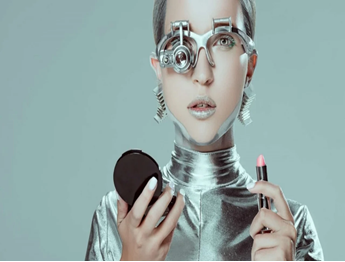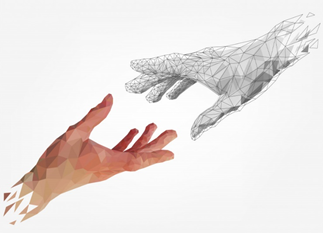Unlocking The Potential of Artificial Intelligence In Beauty And Cosmetics
The Artificial Intelligence (AI) in beauty and cosmetics is the usage of the latest artificial intelligence and machine learning techniques to the interpretation and understanding of the different parts of beauty and cosmetics to give the optimal beauty matching. The features includes face visualization, a skin problem diagnosis, and the personalized suggestions for skincare and the treatment possibilities are the main reasons for its benefits. The main types of AI in the beauty and cosmetics market are the personalized recommendation platforms, performance marketing measurement tools, demand forecasting and supply chain tools, the real-time customer service platforms and AI-based beauty devices. Personalized recommendation tools are either the software or the algorithms that dig into the user data and make the recommendations or the suggestions for the user according to his or her preferences, passions, and behavior.
Market Overview and Latest Innovations
The AI in the beauty and cosmetics market is expected to grow at a high CAGR of 19.6% for the forecast period 2024-2031 which is considered to be a big number. The development of the market is due to the increasing demand of AI technologies for beauty brands to create the personalized beauty solutions by analyzing consumer data such as skin profiles and preferences. Major players in the Artificial Intelligence in Beauty and Cosmetics industry include Beiersdorf (NIVEA skin guide), L’Oréal’s ( Hair Coach), Olay (Skin Care App), CRIXlabs (DBA Quantified Skin), Procter & Gamble Company, Pure & Mine, Sephora Inc., Beiersdorf AG, Shiseido Co. Ltd., InsightAce Analytic, Elizabeth Arden Inc., OpenAI LP, GAN- powered solution, Anokai, EpigenCare Inc., Novi, Perfect Corp,Lottie London, Banuba Inc., Luna Fofo, Revieve, Ciaté London, mySKIN, Haut. Al, YOUS Skincare, My Beauty Matches, Youth Laboratories, Brand Agency London, Econsultancy, Opte Wand, Perso Limited.

Nykaa is the first to bring the L’Oréal’s neural technology, ModiFace AR, to its platform called L’Oréal Advance Virtual Try-On. This new technology is supposed to give company the opportunity to construct a new level of beauty experience for makeup lovers while purchasing beauty products online. ModiFace technology, with its photo-realistic results and AI-enabled shade calibration, gives you the potential of perfecting your picture for any occasion. The ModiFace Technology is the technology, which makes the possibility of virtual try-on, on Nykaa’s website and mobile app, to help shopping customers to choose their desired beauty products in different categories, and the first product line of the L’Oréal range of products is on it.
Coty.Inc. signed a multi-channel partnership agreement with Perfect Corp it would be able to enhance its virtual try-on, online skin diagnostics and data-driven personalization for brands like CoverGirl, Sally Hansen and philosophy, and Coty's broad fragrance portfolio among others, through the collaboration with the partnership.
The technology division of L’Oréal, a traditional Google service customer is a subscriber to Google Cloud’s Vertex AI platform that helps them to come up with AI models for cosmetic services faster. The Vertex platform of the Google, the users can speed up the creation, deployment, and maintenance of machine learning models by uniting Google Cloud Services, machine learning systems, and machine learning operations under one user interface and API.

Furthermore, Perfect Corp. announced an integration with google for the launch of an A.R. interactive beauty try-ons. AR-powered virtual beauty try-on experiences can help online shoppers discover and experiment with various beauty products and shades online through Google search.
Similarly, Proven Skincare is a consumer app that applies machine learning to the generation of a personal skincare routine in accordance with the skin condition of a customer. It is based on a database of customer product reviews, skincare products, ingredients, and scientific details that are used to make the unique recommendations.
Also, Sephora provides a virtual fitting through its website and mobile app, that lets customers to experiment with different makeup looks, watch tutorials, and get product suggestions tailored to them. The application of machine learning to track customer behaviour and preferences, in turn, leads to a huge growth of ROI.
HOW AI EXPECTED TO SHAPE THE FUTURE
The AI in the beauty and cosmetics industry is projected to experience the huge development and change in the next few years. The transformation of the industry is the huge increase in the number of people who are using the AI-enabled personalization which will be the cause of the production of the product specific recommendations, the virtual try on, and the customized beauty routines for the customers. The companies are already in the front runners of this trend, Proven, Atolla, and Shiseido's Optune being the pioneers of the creation of personalized skincare solutions, which are the AI algorithms that observe skin types, concerns, and preferences in order to the personalized regimens.
The advancements in AI technologies, is accelerating the degree of personalization. The way it can be adapted to the changes in skin condition, environmental factors and the individual's goals is getting more and more.
Besides, the AI in the e-commerce has advanced to the point where the beauty brands are now searching for the best way to make the personalized in-store experience for the online shoppers. AI is going to be the driving force in the digital shopping experience, the online retailing of products, the AI-powered chatbots for customer support and the AI-based personalized product recommendations.
The AI has the capability to analyse the shopping patterns, the browsing habits and the individual preferences, consequently, it provides the most personalized and the most immersive digital experiences that will be fit for each customer's needs and wishes. Advancements in AI-based beauty devices are another exciting trend that will shape the future of the industry. The development of innovative devices like LUNA fofo, which offers customized spa massage routines based on skin analysis, is just the beginning of a wave of AI-powered beauty tools that will revolutionize the way consumers approach their skincare and makeup routines. As these devices become more advanced, reliable, and user-friendly, they will offer an increasingly personalized and interactive experience, with the ability to adapt to individual skin types, concerns, and goals. This trend is particularly relevant for younger consumers who have grown up with technology and are accustomed to personalized experiences across various aspects of their lives.
Another potential area of growth for AI in beauty is in skin condition diagnosis. AI technology has the potential to accurately diagnose skin conditions like melanoma, offering a convenient and potentially lifesaving resource for consumers. La Roche-Posay's Efaclar Spotscan is an example of such an AI-powered diagnostic tool, which uses machine learning algorithms to analyse images of the skin and provide personalized recommendations for treatment. As this technology becomes more advanced and widely available, it could revolutionize the way consumers approach skin health, enabling early detection of potential issues and empowering them to take a more proactive approach to their skincare.
Finally, AI will also play a significant role in improving supply chain efficiency in the beauty industry, enabling more accurate demand forecasting and supply planning. By analyse sales data, consumer trends, and market conditions, AI can help beauty brands better anticipate demand and optimize their supply chains accordingly. This will not only help brands meet consumer demand more effectively but also reduce waste and improve sustainability, a growing concern for many consumers in the beauty industry.
Current Challenges Faced By the Company and the Manufacturers
The beauty and cosmetics industry is facing the numerous challenges related to the use of AI technologies. The primary problem is to cut down the AI-related dangers which are the generated content by the AI which may be false or misleading, and secondly, the infringement of the intellectual property rights.
Also, the companies have to come up with a solution of the personalizing benefits and consumer privacy issues and find a balance between the two, which is the way to deal with the ethical conflicts of using biometric data and getting the consent for the usage of the data. One of the major problems includes the struggle against racial bias in AI technology, especially in the realms of facial recognition and shade matching AI. This issue can be addressed by the analysis of a bigger and more diverse data sets for AI training to ensure that the algorithms are equally effective for people with different skin tones.
The fast growth of e-commerce in the beauty industry also causes problems, since companies have to combine the AI-driven personalization and the virtual try-on experiences on the online shopping platforms at the same time, they have to make sure of the right shade and colour matching.
Another obstacle that companies face in the beauty field is the scanning and making of AI-based beauty devices, as they have to create the cutting-edge AI-driven tools for personalized skincare and makeup which are reliable, safe and user-friendly. The major duty is to always keep an eye on the latest technology, which includes the updating of AI algorithms and models as well as the provision of the necessary resources for research and the development of new AI applications in beauty also the establishment of consumer confidence and the attitude of the people towards the AI in the beauty sector is the main condition for the AI to be made successful.
Also, as the beauty industry embraces AI, it will also need to address the issue of inclusivity and diversity in AI development. Many AI systems have been criticized for exhibiting racial bias, particularly in facial recognition and shade matching AI. To overcome this challenge, beauty brands will need to ensure that their AI initiatives are developed using diverse and representative data sets, and that the resulting products and services cater to the needs of consumers with different skin tones and preferences.
In conclusion, the future of AI in the beauty and cosmetics industry is bright, with a range of exciting trends poised to transform the sector in the coming years. From personalized skincare solutions and immersive e-commerce experiences to innovative beauty devices and AI-powered skin diagnostics, AI will play a central role in driving innovation and meeting the evolving needs of beauty consumers. However, as the industry embraces these technologies, it will also need to address challenges around inclusivity, diversity, and ethical considerations to ensure that the benefits of AI are accessible to all and that consumer trust is maintained. With the right approach, AI has the potential to revolutionize the beauty industry, delivering more personalized, effective, and sustainable products and services to consumers worldwide.